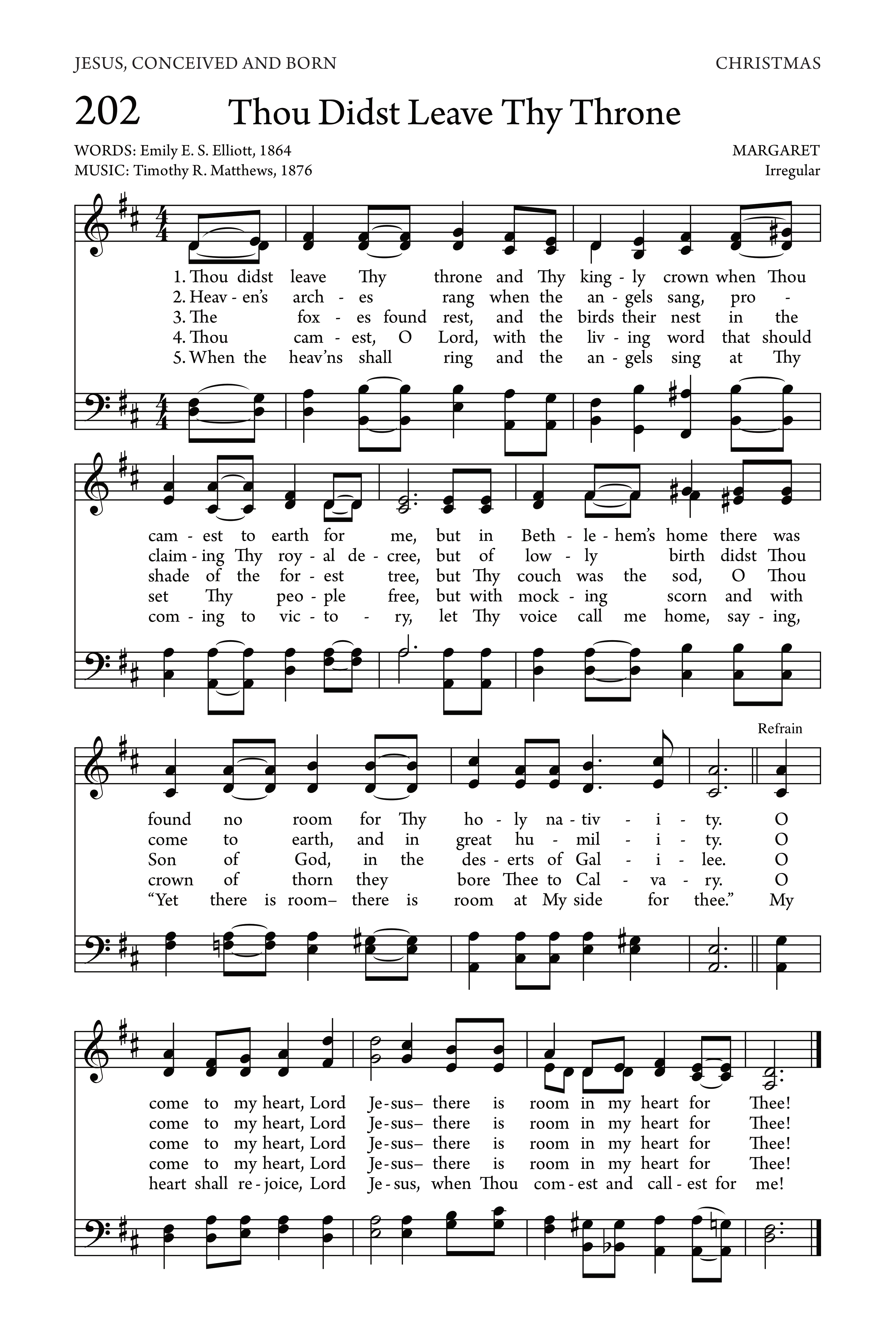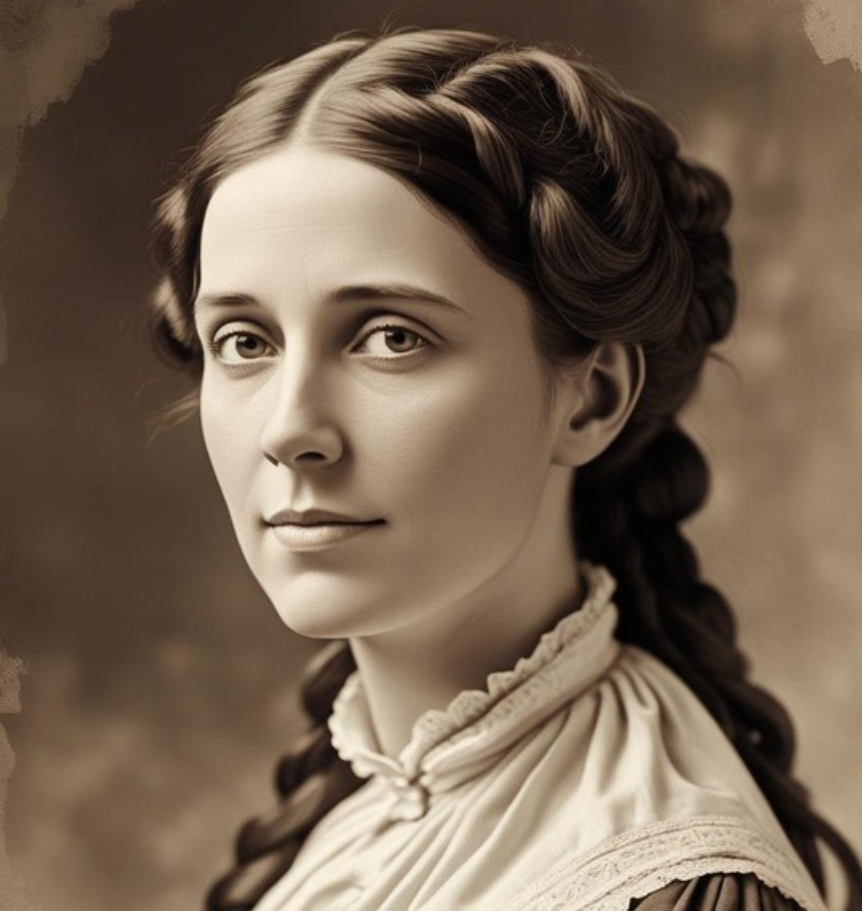Thou Didst Leave Thy Throne
By E. S. Elliot
Lyrics
When Thou camest to earth for me;
But in Bethlehem's home was there found no room
For Thy holy nativity.
O come to my heart, Lord Jesus,
There is room in my heart for Thee.
Proclaiming Thy royal degree;
But of lowly birth didst Thou come to earth,
And in great humility.
O come to my heart, Lord Jesus,
There is room in my heart for Thee.
In the shade of the forest tree;
But Thy couch was the sod, O Thou Son of God,
In the deserts of Galilee.
O come to my heart, Lord Jesus,
There is room in my heart for Thee.
That should set Thy people free;
But with mocking scorn, and with crown of thorn,
They bore Thee to Calvary.
O come to my heart, Lord Jesus,
There is room in my heart for Thee.
At Thy coming to victory,
Let Thy voice call me home, saying "Yet there is room,
There is room at My side for thee."
My heart shall rejoice, Lord Jesus,
When Thou comest and callest for me.
Bible Reference
Luke 2:7
About This Hymn
Author – Emily Elizabeth Steele Elliott, 1836–1897
Composer – Timothy Richard Matthews, 1826–1910
Tune Name – “Margaret”
Meter – Irregular
Scripture Reference – Luke 2:7
Theme Verse – “I am come that they might have life, and that they might have it more abundantly.” – John 10:10b
Emily Elizabeth Steele Elliott was born in Brighton, England, on July 22, 1836. She was the third daughter of Rev. Edward Bishop Elliott, renowned author of the prophetic commentary Horae Apocalypticae. Emily remained closely connected with the evangelical wing of the Anglican Church and was especially devoted to mission work, rescue homes, and Sunday School ministries throughout her life.
As a writer, Emily Elliott displayed both spiritual depth and a remarkable gift for clear expression. She edited the Church Missionary Juvenile Instructor for six years and published several collections of hymns. Among them were Chimes of Consecration (1873), Chimes for Daily Service (1880), and a special version of the latter titled Under the Pillow, which was designed in large type for hospital patients and the infirm. Many of her hymns were intended for children, and she wrote with a gentle clarity that made profound truths accessible to young minds.
Her best-known hymn, based on Luke 2:7, was originally printed for the choir and schoolchildren of her father’s parish, St. Mark’s Church in Brighton. It was designed to teach the truths of the Advent and Nativity season. Elliott skillfully contrasts Christ’s eternal glory with His earthly rejection through a series of poignant stanzas, each beginning with the word “but.” These contrasts include heaven’s crown versus the inn’s rejection, royalty opposed by humiliation, creation’s homes while Christ wandered, and the gift of redemption met with the agony of Calvary. The final stanza reverses the pattern, declaring Christ’s triumph and return.
Timothy Richard Matthews composed the tune “Margaret” specifically for this text. Born on November 4, 1826, in Bedford, England, Matthews was a respected organist, clergyman, and prolific composer of over one hundred hymn tunes. His melody complements the text with solemn dignity and deep emotion. The hymn was first published in Gospel Hymns No. 3 (1878), where it gained wide use during the great evangelistic campaigns of D. L. Moody and Ira Sankey.
Emily Elliott was also the niece of Charlotte Elliott, author of “Just As I Am,” and her own contributions to hymnody include titles such as “Brothers, sisters, pray for us,” “Rabboni, Master, we have heard,” “Full consecration! heart and spirit yielded,” and “They come and go, the seasons fair.” Each of these hymns appeared in mission publications and church hymnals and were often sung at gatherings of the Church Missionary Society and Gleaners' Union. She passed away on August 3, 1897, in Mildmay, London.
Elliott’s hymn writing reflects a heart full of expectancy and hope, pointing both to the Messiah who came and to the King who will come again. Her work remains a treasured part of English hymnody, not only for children but for all who long to understand and sing of the Savior’s love.


📬 Subscribe to Our Devotional Updates
Receive weekly hymns, devotionals, and website features directly in your inbox.
Hymn Information

- Category: Hymn
- Author/Writer: E. S. Elliot (1864)
- Added: July 11, 2025
- Last Updated: September 25, 2025
- Views: 1123
To view the author's biography, click their name above.
MIDI File
Popular Hymns
Recent Blog Posts
Popular Blog Posts
Visit Us on Social Media
Latest from X (Twitter)
Tweets by HymnalLibraryLatest from Facebook
Latest on YouTube
Daily Bible Verse
Disclaimer
The hymns, sheet music, MIDI files, and related content on this website are provided for educational and research purposes only.
- Public Domain: Many of the hymns featured here are in the public domain and may be freely used.
- Copyrighted Works: Some hymns may still be under copyright protection. Where applicable, permission has either been requested from the copyright owner, or the content is shared under the principles of fair use for educational purposes.
⚠️ Important Notice: If you wish to reproduce, distribute, or use any copyrighted hymn beyond personal study or educational use, you must obtain permission directly from the copyright holder. This website does not grant any rights for commercial use yet.
If there is any other question please address it to us in our Contact Page, for further assistance. Thank you for using the site. May God Bless You.













